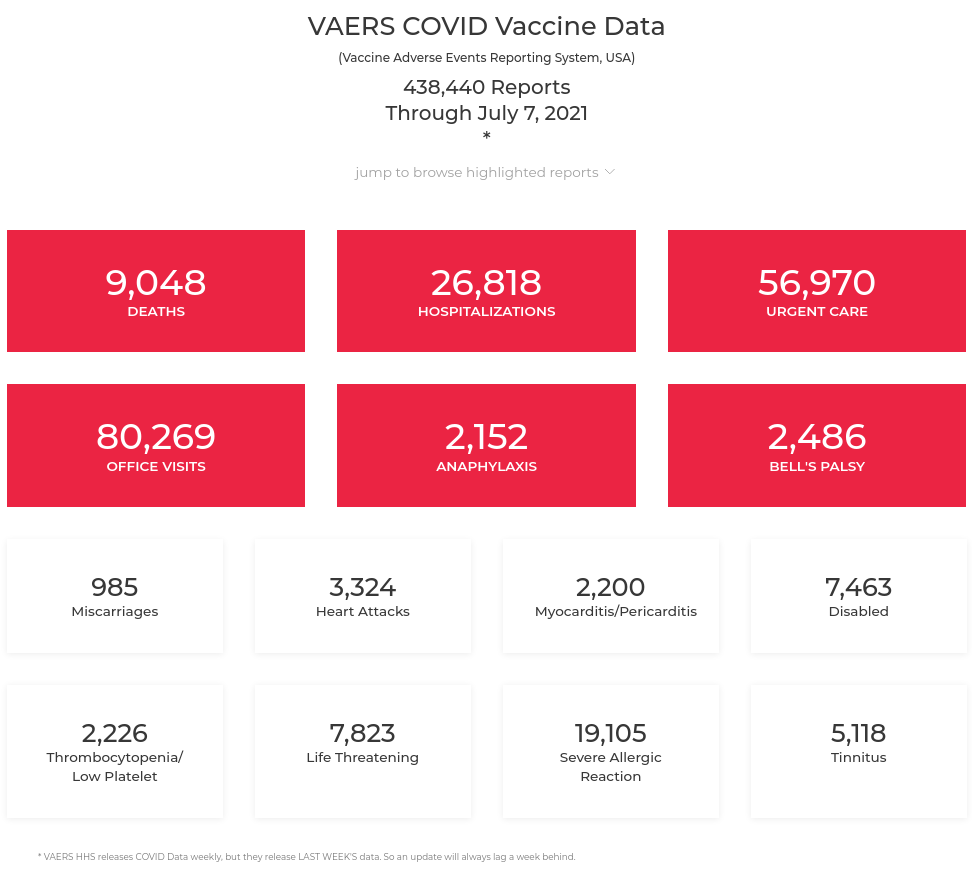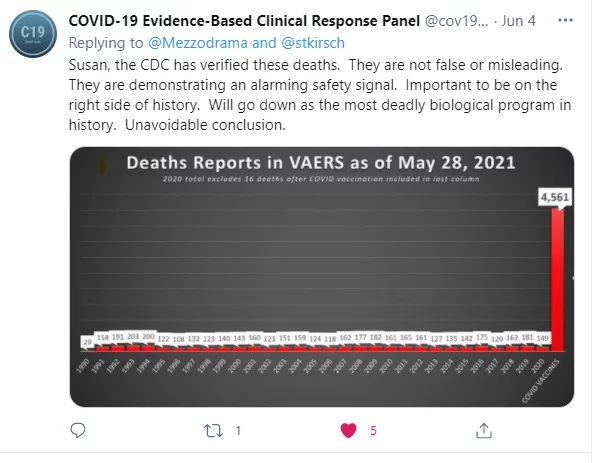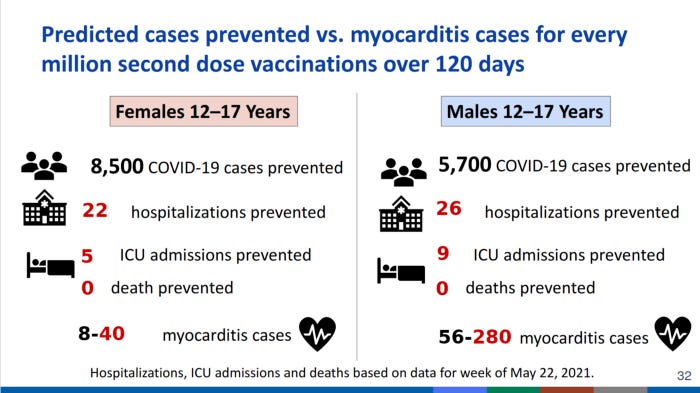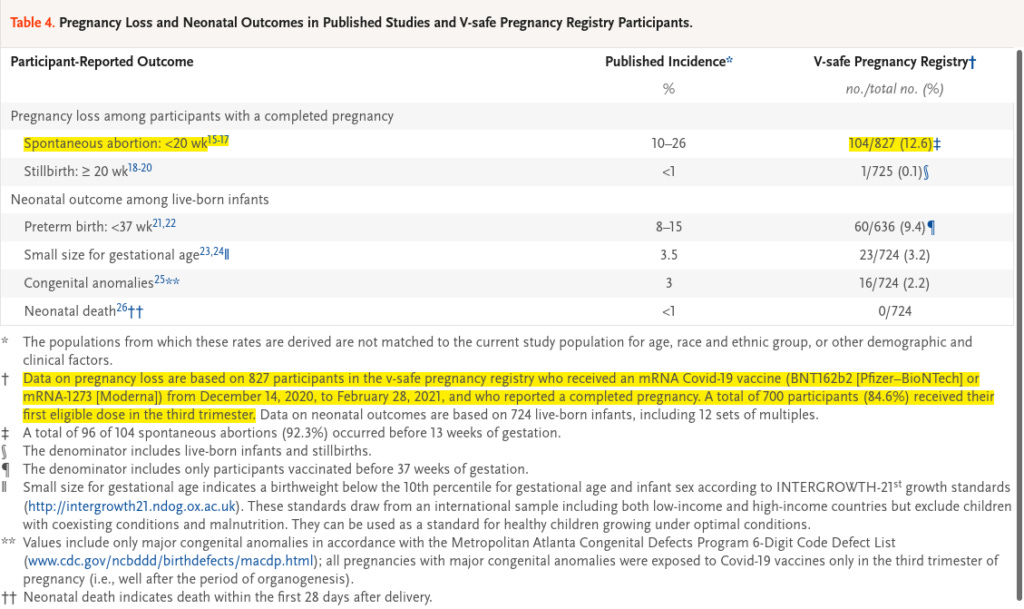Last month, I encouraged readers weighing the pros and cons of accepting a COVID-19 jab to ask seven questions before making their decision.
If you're still pondering the decision, here are five more questions to ask:
Question 1: How common are adverse reactions to COVID-19 injections?
Actually, this is something of a trick question, because the answer is "Nobody really knows". And the reason nobody really knows is that there is no effective system for collecting data on adverse events that occur after vaccination and investigating them to determine whether or not they were actually caused by the vaccine, or whether they occurred coincidentally.
In countries that have a universal health care system, such as Medicare in Australia and the National Health Service in the UK, it would be quite easy to collect information on health care provider visits, hospital admissions and diagnoses, and use data analytics to identify correlations between vaccine status and health status. These correlations could then be further investigated using laboratory and clinical research methods to distinguish causal relationships from coincidences.
However, no such ‘vaxed vs unvaxed’ or even ‘fully vaxed vs partially vaxed’ studies have ever been done, by any health authority.
In 2013, the US Institute of Medicine acknowledged that a study comparing health outcomes in children vaccinated according to the recommended schedule to those who were not vaccinated at all, or vaccinated according to alternative schedules, was feasible "through analyses of patient information contained in large databases such as VSD [Vaccine Safety Datalink]". However, the Centers for Disease Control and Prevention (CDC) conceded in 2020 that they had never conducted such a study despite clearly having the means and opportunity to do so.
Existing systems for gathering information on potential adverse reactions to vaccines are pathetically ineffective. For example, a study conducted in 2010 by Harvard Pilgrim Health Care, Inc, a large not-for-profit managed care provider, found that “fewer than 1% of vaccine adverse events are reported” to VAERS, the US Vaccine Adverse Event Reporting System.
Even if adverse events after COVID-19 injections are being reported at a higher rate than for other vaccines (which is highly likely given heightened public awareness of well-publicised side-effects such as blood clots, and the rapid dissemination via social media of health impacts that are not typical after vaccination, such as menstrual disorders), the following snapshot of VAERS data on reported adverse events to date, is alarming:
As Steve Kirsch has pointed out,
"COVID vaccines have generated more adverse reports in the last 6 months than all 70 vaccines over the past 30 years combined."
The number of deaths occurring soon after receipt of a COVID-19 jab is even more alarming when put in the context of the total number of deaths reported to VAERS over its 30 year history:
While these data do not provide proof that COVID-19 jabs caused the reported adverse events, including deaths, the facts that 22% of deaths occurred within 48 hours of receiving a shot and 37% occurred in people who became ill within 48 hours of being jabbed are strong safety signal that demands urgent investigation.
Post mortem examinations (autopsies) are a vital element of the investigation process, yet as of Jul 9, only one autopsy report had been published in the medical literature. Autopsy rates are at an all-time low, crippling attempts to understand causal mechanisms that might lead to death after injection.
Question 2: What are the long-term consequences of myocarditis after a COVID-19 injection?
Politicians, public health officials and the corporate media alike have been frantically downplaying the seriousness of myocarditis (inflammation of the heart muscle) which is occurring at alarming rates in young people, especially males, who have received mRNA injections such as the Pfizer-BioNTech shot.
Every mention of myocarditis is preceded by the word "mild", with the reassurance that most cases are resolving spontaneously. "The benefits of COVID-19 vaccination outweigh the risks" is the constant refrain.
But this is complete nonsense, on several levels.
Firstly, the young are at extraordinarily low risk of developing severe outcomes from SARS-CoV-2 infection, so any harms that occur after a COVID-19 injection are likely to be greater than the harms they might suffer from natural infection.
The risk-benefit analysis for teenagers in relation to myocarditis is particularly stark:
As Dr Roger Hodkinson has pointed out, myocarditis is never "mild". Myocarditis means that muscle cells in the heart have died, and they never regenerate. A person who has experienced myocarditis in their youth has a weakened heart muscle for the rest of their life, leaving them at substantially increased risk of heart failure decades later.
Watch Dr Hodkinson explain it in this 15 minute video.
Question 3: Are COVID-19 injections safe for pregnant women?
A study published in the New England Journal of Medicine analysed data from VAERS, the “v-safe after vaccination health checker” surveillance system, and the v-safe pregnancy registry, involving 35 691 women aged 16-54 who received COVID-19 injections during pregnancy.
The authors claimed that "preliminary findings did not show obvious safety signals among pregnant persons who received mRNA Covid-19 vaccines" and that rates of spontaneous abortion (pregnancy loss before 20 weeks, commonly called "miscarriage") were within normally-reported ranges.
However, careful analysis of data presented in Table 4 of the study, tells a very different story:
104 of the 827 participants enrolled in the v-safe pregnancy registry, experienced miscarriage. The authors incorrectly used 827 as the denominator, to yield a miscarriage rate of 12.6%, which is within the expected range.
However, the footnotes to the table state that 700 of the 827 participants received their first dose of a COVID-19 injection in the third trimester of pregnancy - that is, during or after the 27th week of pregnancy.
Since spontaneous abortion (miscarriage) is defined as pregnancy loss before the 20th week of pregnancy, these 700 women must be excluded from the denominator.
That leaves a maximum of 127 women who received their injection in the first or second trimester of pregnancy. Assuming that many of these 127 got the jab before week 20, the true rate of spontaneous abortion was as high as 104/127 - which means that a staggering 82% of women who received a COVID-19 injection in early pregnancy suffered a miscarriage.
How did it happen that neither the 21 authors of the study, nor the peer reviewers at New England Journal of Medicine, managed to pick up on this very obvious misrepresentation of the pregnancy safety data? I'll leave you to come to your own conclusions.
Question 4: How will the COVID-19 injection affect my immune system?
While vaccine enthusiasts love to claim that the act of vaccination is simply a safe way of mimicking the effects of natural infection, thus attaining the benefit of immunity to disease without the risks of natural infection, this is simply untrue.
When we come in contact with pathogens (such as bacteria or viruses), our innate immune system responds first, with a fairly generalised defence, then our acquired immune system gears up with specialised defences against the pathogen. In military terms, it's analagous to aiming artillery fire at the enemy, then following up with hand-to-hand combat.
Dr Shiva Ayyadurai explains the process clearly in this video:
Vaccination, however, bypasses the innate immune system, delivering the bacterial or viral antigen directly to the acquired immune system. And as recent research has demonstrated, in the case of COVID-19 injections, this may have undesirable effects on immune function.
A research paper currently hosted on a pre-print server (i.e. not yet peer-reviewed), titled 'The BNT162b2 mRNA vaccine against SARS-CoV-2 reprograms both adaptive and 1 innate immune responses', found that the Pfizer-BioNTech injection reduced the innate immune system's response to viral infection, but ramped up its reaction to fungi.
As the authors point out, the implications of this finding are concerning: people who receive the Pfizer-BioNTech jab may become more susceptible to infection by other viruses, but may also experience an abnormally strong inflammatory response to fungi, including those that normally inhabit the human body (commensals).
Just such an abnormal immune response to commensal fungi is seen in Crohn's disease, a type of inflammatory bowel disease. The immune system of Crohn's disease patients violently attacks fungi that normally inhabit the skin and gut as if they were deadly enemies, showering them with inflammatory chemicals that result in 'friendly fire' damage to the gut lining, resulting in abdominal pain, ulceration and bleeding.
The Pfizer-BioNTech jab also increased production of interferon alpha gamma (IFN-γ) - a crucial 'bridge' between the innate and adaptive arms of the immune system, as explained in the video above - in response to the B.1.351 (South African) variant, but decreased IFN-γ production in response to other viruses.
Once again, the worrying implication of this finding is that even if the Pfizer jab does induce immunity against at least some variants of SAR-CoV-2, it may hamper the immune response to other viruses. In other words, people who receive this experimental vaccine may be protected against COVID-19, but more susceptible to influenza, herpes, respiratory syncytial virus, or any of the myriad of viruses that can infect and cause disease in humans.
In addition, the antibodies induced by the Pfizer jab were ineffective against the B.1.351 (South African) variant, with only 37.5% of post-vaccine serum samples showing neutralising activity against this variant.
"These data support the evidence that B.1.351, and possibly other variants, may be able to escape vaccine-induced humoral immunity to a certain extent.”
The BNT162b2 mRNA vaccine against SARS-CoV-2 reprograms both adaptive and 1 innate immune responses
The study's findings of reduced immune responses to variants of SARS-CoV-2 in people who received the Pfizer-BioNTech jab leads on to the next question.
Question 4: Is vaccine-induced immunity better than, worse than, or the same as natural immunity to SARS-CoV-2?
While there is now ample evidence that people who contracted an infection with SARS-CoV-2 and recovered, have strong, broad-based and prolonged immunity against reinfection, including with variant strains, the same cannot be said for people who have received COVID-19 injection.
For example, about half the adults infected in an outbreak of the Delta variant of SARS-CoV-2 (formerly called the Indian variant, or B.1.617.2) in Israel had received both shots of the Pfizer-BioNTech injection.
Data released by Public Health England reveal that 0.78% of people who had received both doses of a COVID-19 injection but were diagnosed with infection with the Delta strain, died within 28 days of their positive test. However, only 0.14% of unvaccinated people died within 28 days of testing positive to the Delta strain.
In other words, people who were "fully vaccinated"were 5.6 times as likely to die after being infected with the Delta strain than if they had not received a COVID-19 injection.
Final thoughts
In summary, there are many valid concerns about the short- and long-term safety and efficacy of the COVID-19 injections that are being insistently pushed on us. Intelligent people ask questions and demand answers before making decisions, especially when it comes to decisions that impact on their health.
"Trusting the science" should mean engaging fully in the scientific process, which entails thorough investigation of every hypothesis, and vigorous debate between proponents of opposing viewpoints.
Anyone who tells you to simply shut up and accept the guidance of 'experts' is an anti-science charlatan and should be immediately dismissed from your panel of advisers.








Nice to hear a voice of reason. Data doesn’t support our headlong charge into “van or bust” mentality. Thank you.
This information has to be out there. If people still decide to have the jab after reading this, good luck!
Thanks Robyn.